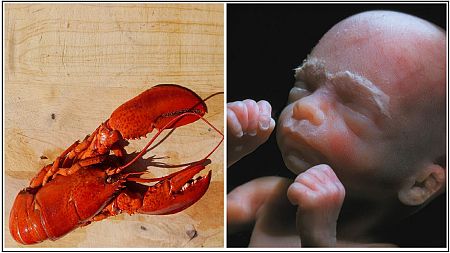When people care more about the pain inflicted on a lobster than the unborn
Under pressure from animal welfare campaigners, the government is now apparently considering a ban on the boiling of live lobsters during cooking. It's a cruel and inhumane practice, campaigners have argued – supported by Mr Johnson's own wife, Carrie.
There's compelling scientific evidence that they feel pain. They must be protected from such cold-blooded and heartless brutality! And our Prime Minister has reportedly heard these cries, because Boris Johnson has now promised that for the future, when drawing up policy and regulations, all government departments will be required to consider, by law, the safeguarding of creatures' physical wellbeing and feelings.
Accordingly, a clause is under consideration to be inserted into the Animal Welfare (Sentencing) Bill, currently making its way through the House of Lords. At the moment the Bill covers vertebrates - animals with a backbone. But, if the amendment is accepted, it will be extended to include shellfish and cephalopod molluscs such as lobsters, crabs, octopuses, squid, cuttlefish, and any other invertebrates capable of feeling pain.
This is groundbreaking, and surely to be welcomed. We should never inflict mindless cruelty, be it raising a calf in isolation and darkness before cutting its throat, or boiling a live lobster. But, for consistency's sake, should we not extend the same protections to our own species – which, after all, has both a backbone and is sentient? In which case, should there not now be a radical change of policy towards our treatment of the unborn?
Under UK law, very broadly, abortion up to 24 weeks is permitted where there is a risk of injury to the physical or mental health of the mother, or to any existing children of the family. Beyond that, abortion up to term is allowed where the mother's life is in grave danger, or there is substantial risk that the child, if born, will suffer such physical or mental abnormalities as to be seriously handicapped.
Up to now, foetuses undergoing abortion at whatever stage of gestation have been subjected to both medical and surgical intervention without any kind of pain relief. The thinking has been - much like the now discredited approach to lobsters - that they don't need it, because they don't feel pain.
However, recent research has now clearly established that from as early as 12 weeks' gestation the foetus has an immediate and unreflective response to pain. Certainly, the unborn child does not at this point have the capacity for self-reflection, but the evidence is clear that, just like the lobster, it reacts to pain. Surely, therefore, it should be protected.
Mahatma Ghandi famously said, 'The true measure of any society can be found in how it treats its most vulnerable members.' What, therefore, can be said of a society that rates the wellbeing of lobsters over that of its unborn?
There are different types of abortion. In early medical abortion, up to 9 weeks 6 days, the mother is typically given mifepristone, which causes the lining of the womb to disintegrate, followed by misoprostol, which then induces contractions to push the child out. These are the pills used for so-called DIY home abortions.
But after this period, the methods change. For medical abortions beyond that time, a saline solution may be injected into the amniotic fluid, causing the foetus to die of acute and extremely painful salt poisoning; or the mother may be given prostaglandin, which causes premature and violent contractions, typically 'crushing' the foetus to death; or the baby's heart may be directly injected with potassium chloride, producing a heart attack. Perhaps, needless to say, all these procedures cause the unborn child extreme pain.
Surgical abortion is even more brutal, because instruments are used to kill the unborn child in utero, and then remove him or her from the mother's womb. Typically, for example, the baby may be dismembered, then suctioned out into a glass canister – and though abortion providers claim this is 'a simple procedure with gentle suction', the reality, for the unborn child, is extreme pain. And possibly terror.
For a society to condemn the unthinking cruelty displayed towards animals merely to satisfy our appetite for culinary delight, and yet seemingly approve this brutal and inhumane treatment meted out to the unborn in abortion, is nothing less than hypocrisy.
A woman may claim the right to decide whether or not she wants her baby, on the grounds its her body and her life ... but does she really have the right to inflict such pain and suffering on one who cannot speak out for and defend themself? Do we?
Surely another clause should be inserted in the Animal Welfare (Sentience) Bill, this time extending protection to humans too.


